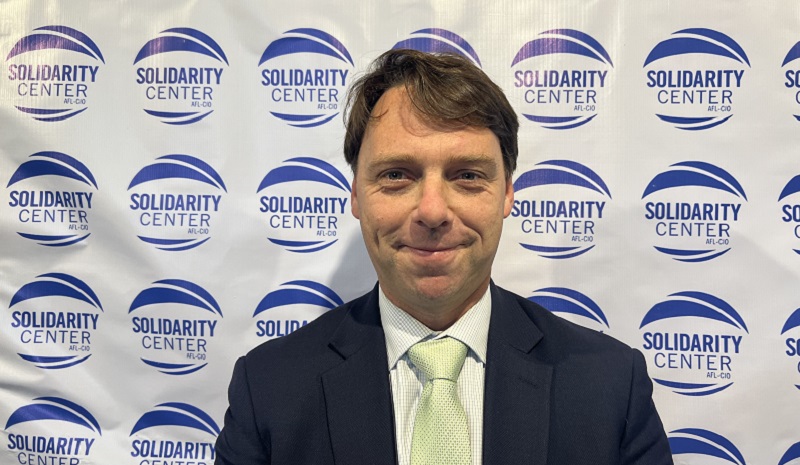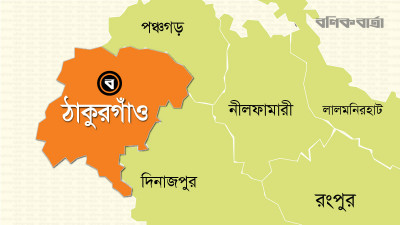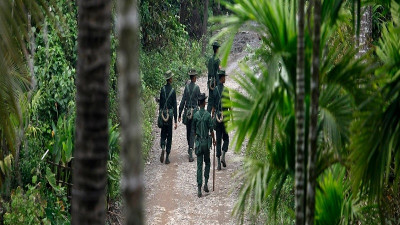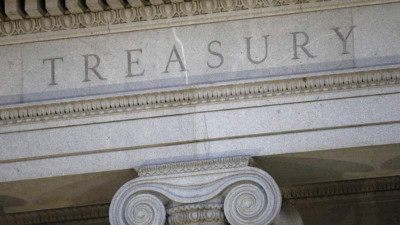 Brendan Lynch Photo: US Embassy Dhaka
Brendan Lynch Photo: US Embassy Dhaka Brendan Lynch, Acting Assistant Secretary for South and Central Asia at the Office of the US President's Trade Representative (USTR). He left Dhaka on May 23, 2023, after a four-day visit from May 20. He spoke to Bonik Barta on various issues including bilateral trade between Bangladesh and the United States, labor rights situation, and intellectual property. Interviewed by Badrul Alam
What is your assessment of the progress in trade and investment cooperation between the United States and Bangladesh under the Trade and Investment Cooperation Forum Agreement (TICFA), which was signed in 2013?
The TICFA has been a valuable mechanism for exploring ways to reduce barriers and expand trade. In December 2022, the sixth TICFA Council meeting took place in Washington, where our two countries discussed a range of issues impacting the bilateral trade relationship, including market access for agricultural products, labor rights, technical barriers to trade, digital trade policies, intellectual property protection and enforcement, and policies impacting the investment climate. Both the United States and Bangladesh stressed the importance of our strong economic and trade relationship, which in 2021 surpassed $10 billion in two-way trade in goods. Just as we agreed to then, we look forward to continuing to utilize the TICFA to boost future bilateral trade and investment opportunities through sustained engagement and technical work.
Can you provide insights into the likelihood of Bangladesh regaining Generalized System of Preferences (GSP) benefits in the U.S. market?
As you are aware, Bangladesh lost access to GSP in 2013 due to labor rights violations, including shortcomings in worker rights and unsafe working conditions. The United States is working closely with the Government of Bangladesh to advance internationally recognized worker rights, particularly the rights to freedom of association and collective bargaining.
The GSP program expired on December 31, 2020, and is subject to U.S. Congressional re-authorization. Following the program’s reauthorization, Bangladesh would need to meet all of the eligibility criteria established in the statute, including any criteria related to worker rights. This would be reviewed through a robust interagency process and the President would then need to make a determination whether Bangladesh is meeting the requisite eligibility criteria. Congress is discussing the potential reauthorization of GSP.
Considering the incidents at Tazreen and Rana Plaza, what is your opinion on the development of the working environment in Bangladesh’s industrial sector?
The United States is committed to supporting Bangladesh in improving compliance with international labor standards. We recognize that over the past ten years following the Rana Plaza disaster, Bangladesh has made progress to improve fire and building safety as well as in establishing and training worker-management safety committees at many of the export garment factories.
Bangladesh has now long been one of the largest garment exporters globally, but this comes with expectations and obligations. These include not just producing good quality products, but also safe working conditions where workers’ rights and dignity are respected. Significant work is still needed, including completing the remediation of safety hazards at all inspected factories.
More work is needed to protect worker rights so that they can form unions and collectively bargain without fear of reprisal. As a key bilateral trade partner with Bangladesh, the United States wants to see Bangladesh succeed in making progress on worker rights, not only in the garment sector but throughout the economy. This means ensuring workers have the right to organize and collectively bargain for better wages and safer working conditions, particularly in the export processing zones.
We would like to know more about the United States concerns about the labor situation in Bangladesh.
The United States continues to work closely with Bangladesh to make progress on internationally recognized worker rights. In addition to the TICFA mechanism, our countries have launched a U.S.-Bangladesh Labor Working Group, led by our labor attaché at the U.S. Embassy in Dhaka, that is working closely to resolve priority labor issues. The deployment of a labor attaché in Bangladesh is a clear indication that the U.S. government is committed to seeing progress on labor, and relatedly, on trade.
We are closely tracking progress of the International Labor Organization’s roadmap concerning labor law reform, trade union registration, increasing labor inspections and enforcement, and addressing acts of anti-union discrimination and unfair labor practices. We particularly want to see progress on the Bangladesh Labor Act and hope those amendments will be finalized soon to align with international labor standards.
The United States is one of the largest cotton-producing countries and Bangladesh imports cotton from the U.S. for manufacturing garments. Stakeholders have been demanding for duty-free access when exporting garments made with U.S. cotton to the US market. Is there any possibility of consensus between the two countries on this matter?
In the United States, tariff preferences are the purview of Congress. Bangladesh supplied close to 10 percent of the total U.S. apparel imports. Despite the lack of tariff preferences, Bangladesh is the third largest supplier to the U.S. market, with a record $9.7 billion in apparel exports to the United States in 2022, up from $5.9 billion in 2019. We continue to expect Bangladesh to be a competitive supplier to the U.S. market.
What should be done to solve the existing complications in the import of cotton from the United States? What is the latest policy regarding cotton fumigation?
I am happy to report that Bangladesh has removed the fumigation on-arrival requirement for U.S. cotton, following a thorough scientific analysis. This policy benefits both the United States and Bangladesh. Bangladesh is the second-largest cotton importer in the world and has the second-largest RMG industry globally. Removing the fumigation requirement on U.S. cotton eliminates an unnecessary cost and saves the Bangladeshi RMG sector significant time and money. Working together with the Government of Bangladesh to solve this issue is a great example of how our two countries can collaborate to increase prosperity and remove trade barriers.
What recommendations do you have on the business environment in Bangladesh to enhance bilateral trade and commercial activities?
There are several actions that Bangladesh can take as it competes with other countries to attract more investment. For instance, U.S. businesses look for transparent and predictable regulatory environments when deciding where to invest. Likewise, more companies will look to invest here as Bangladesh further develops a skilled workforce, whose rights are protected, and builds a transparent and predictable regulatory environment.
কংগ্রেস এখন জিএসপির সম্ভাব্য পুনঃঅনুমোদন নিয়ে আলোচনা করছে | |
Are there any concerns regarding intellectual property rights and their implications for U.S. investments in Bangladesh?
The significance of intellectual property rights in facilitating a favorable environment for investments is critical. While the United States values its strong bilateral economic ties with Bangladesh, we have concerns regarding intellectual property rights and their implications on investments in the country. We can address these concerns through constructive dialogues and by fostering a robust framework that safeguards innovation, creativity, and investment.
U.S. investment in Bangladesh is concentrated mainly in the energy sector. What should be done to diversify the U.S. investment in Bangladesh?
The United States has a long history of supporting Bangladesh’s energy sector, in particular new forms of energy, including renewable and sustainable forms of energy, as well as green technology that will help combat the climate crisis. Based on what we hear and see in other international markets, to incentivize investment, Bangladesh needs to establish a transparent and predictable regulatory environment.
What does the United States expect from the Bangladeshi private sector concerning business practices that may help to attract U.S. investments?
The United States encourages the Bangladeshi private sector to engage in strong corporate governance and responsible business conduct, including sustainable and socially responsible practices, as these factors are increasingly important to investors. Government policy is also key to attracting investment though, including transparency, protecting intellectual property rights, and encouraging fair and non-discriminatory treatment of investors.






